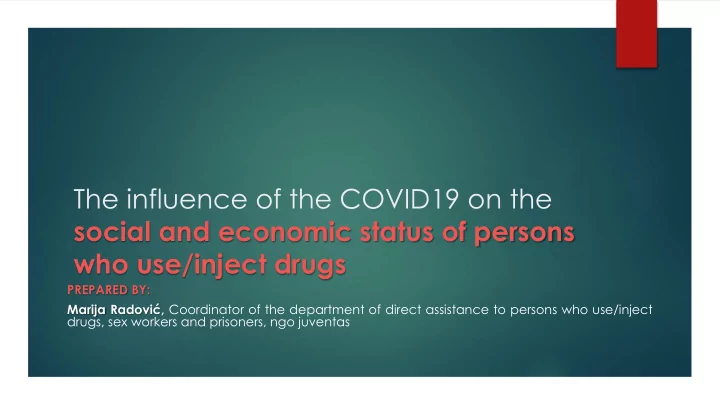

The influence of the COVID19 on the social and economic status of persons who use/inject drugs PREPARED BY: Marija Radovi ć, Coordinator of the department of direct assistance to persons who use/inject drugs, sex workers and prisoners, ngo juventas
We decided and managed ... Work modality: From the very start of measures for prevention of corona virus spread being introduced we decided and managed to continue with providing services to all the vulnerable communities we work with. Juventas has been cooperating with NGOs “Queer Montenegro”, Mon tenegrin Harm Reduction Network LINK, Trans/Gender Variant persons' Association “Spectra” and LBTQ Women's Association “ Stana ” since their existence, so during these difficult times we partnered more than ever to provide the highest quality services to our clients .
Challenges defined? Some of the challenges that the communities of persons who use/inject drugs, sex workers and ex- prisoners encountered included: loss of jobs; the inability to maintain economic independence; increased risk of homelessness; mental health endangered or worsening due to social isolation and no contact with the loved ones; increased risk of contracting corona virus due to other infections and conditions such as HIV, hepatitis B and C; increased risk of domestic violence incidence rise. .
... In addition, with the COVID 19 crisis emerged all the inequalities and social injustices. We have seen this in the HIV/AIDS epidemics, those most marginalized of societies became the most vulnerable to HIV/AIDS and we are seeing that in the COVID-19 pandemic: those who are at the margins of society, the homeless, the poor, those without access to health care services, face extra difficulties and have to make difficult choices between their health or feeding their families. At the same time incurring the stigma and discrimination of those who have the privilege of complying with these public health measures
... Although social attitudes about people who use drugs (PWUD), sex workers, ex-prisoners have changed in recent years and part of the services are supported by the Ministry of Health, they continue to live with discrimination and exclusion on both individual as well as institutional level. Given the stress experienced and survived due to existing stigma, inequality and harassment, our clients are at a greater risk of deteriorating mental health. All available resources, are focusing on fighting the pandemic. Unfortunately, in that particular process the government of Montenegro does not take into account the difficulties that certain groups of citizens face, which even in better times have a disadvantaged position in comparison to the general community. Therefore, we strived to fill the gaps we have in the system that are visible now more than ever. Due to challenges and needs of our communities in the time of crisis our services needed to adapt.
What (do/did) we do ? Distribution and exchange of safe injection equipment (syringes, needles, cookers, medical alcohol, elastic tourniquets, etc) in Drop-in centers and during outreach; Distribution of free condoms and lubricants in Drop-in centers and during outreach; Service of washing and drying of laundry and garments (on a regular basis, but now even more so as a part of measures preventing the spread of Corona virus); Online and phone counseling with outreach and expert workers (doctor, psychologist, social worker); Delivering food packages for the ones most economically challenged (once per week, quantity for 7 days) with the written approval of the National Coordinating Mechanism for Communicable Diseases.
What can we additionaly do? Work on the motivation of our clients to have safe injecting practices in mind no matter what. (Certain cases of complete neglect of ones’ injecting practices show the so called COVID19 related „caution fatique“ in the population of persons who use/inject drugs. (caution fatique is an unintentional occurrence that happens when people show low motivation or energy to comply with safety guidelines.) Deal with our clients on an individual basis and take specific steps in cooperation with them. Ensure sustainability of services. Expand services for the same to be completely in line with needs. Draw public attention to the importance of our programs and services so that the decision makers are not neglecting the consequences the pandemic has on our clients who are now even more endangered.
Thank you for your attention. NGO Juventas Address: Marka Miljanova, 42, 81000 Podgorica, Montenegro E-mail: juventascg@gmail.com Phone: +382 20 657 098
Recommend
More recommend